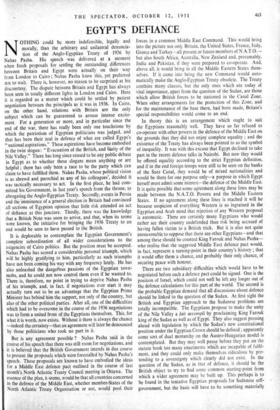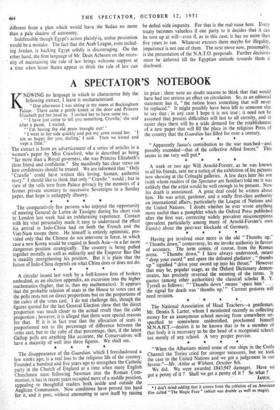EGYPT'S DEFIANCE
NOTHING could be - more indefensible, legally. and morally, than the arbitrary and unilateral denuncia- tion of the Anglo-Egyptian Treaty of 1936 by Nahas Pasha. His speech was delivered at a moment when fresh proposals for settling the outstanding differences between Britain and Egypt were actually on their way from London to Cairo ; Nahas Pasha knew this, yet preferred not to wait. There is, however, no reason to be surprised at his discourtesy. The dispute between Britain and Egypt has always been seen in totally different lights in London and Cairo. Here it is regarded as a matter which could be settled by patient negotiation between the principals as it was in 1936. In Cairo, on the other hand, relations with Britain are the only subject which can be guaranteed to arouse intense excite- ment. For a generation or more, and in particular since the end of the war, there has really been only one touchstone by which the patriotism of Egyptian politicians was judged, and that has been their zeal in defence of what are called Egypt's "national aspirations." These aspirations have become embodied in the twin slogan: " Evacuation of the British, and Unity of the Nile Valley." There has long since ceased to be any public debate in Egypt as to whether these slogans mean anything or are helpful ; there has only bden a race to be the party which can claim to have fulfilled them. Nahas Pasha, whose political vision is as shrewd and parochial as any of his colleagues', decided it was tactically necessary to act. In the first place, he had com- mitted his Government, in last year's speech from the throne, to abrogating the Anglo-Egyptian Treaty. Secondly, events in Persia and the imminence of a general election in Britain had convinced all sections of Egyptian opinion that little risk attended an act of defiance at this juncture. Thirdly, there was the knowledge that a British Note was soon to arrive, and that, when its terms were known, the initiative for bringing the 1936 Treaty to an end would be seen to have passed to the British.
It is deplorable to contemplate the Egyptian Government's complete subordination of all wider considerations to the exigencies of Cairo politics. But the position must be accepted. Nahas Pasha has scored a considerable personal triumph, which will be highly gratifying to him, particularly as such triumphs have not been coining his way with any frequency lately. He has also unleashed the dangeNus passions of the Egyptian town- mobs, and he could not now control them even if he wanted to. There is, therefore, no point in trying to deprive Nahas Pasha of his triumph, and, in fact, if negotiations ever start it may actually turn out to be an advantage that the Egyptian Prime Minister has behind him the support, not only of the country, but also of the other political parties. After all, one of the difficulties which had to be overcome in the course of the 1936 negotiations was to form a united front of the Egyptians themselves. This, for what it is worth, now exists. Without it there is always the chance —indeed the certainty—that an agreement will later be denounced by those politicians who took no part in it.
But is any agreement possible ? Nahas Pasha said in the course of his speech that there was still room for negotiations, and it is believed that the British Government intends in due course to present the proposals which were forestalled by Nahas Pasha's speech. These proposals are known to have embodied the ideas for a Middle East defence pact outlined in the course of last month's North Atlantic Treaty Council meeting in Ottawa. The essence of the plan, it seems, would be that all countries concerned in the defence of the Middle East, whether member-States of the North Atlantic Treaty Organisation or not, would pool, their forces in a common Middle East Command. This would bring into the picture not only Britain, the United States, France, Italy, Greece and Turkey—all present or future members of N.A.T.O.- but also South Africa, Australia, New Zealand and, presumably. India and Pakistan, if they were prepared to co-operate. And, above all, it would bring in all the Middle Eastern States them- selves. If it came into being the new Command would auto- matically make the Anglo-Egyptian Treaty obsolete. The Treaty =thins many clauses, but the only ones which are today of vital importance, apart from the question of the Sudan, are those which allow British forces to be stationed in the Canal Zone. When other arrangements for the protection of this Zone, and for the maintenance of the base there, had been made, Britain's special responsibilities would come to an end.
In theory this is an arrangement which ought to suit the Egyptians reasonably well. They have so far refused to co-operate with other powers in the defence of the Middle East on the grounds that they did not enjoy complete equality ; and the existence of the Treaty has always been pointed to as the symbol of inequality. It was with this excuse that Egypt declined to take part in the recent defence talks in Nairobi. But now they would be offered equality according to the strict Egyptian definition, and if in the end foreign troops were still to be seen on the banks of the Suez Canal, they would be of mixed nationalities and would be there for one purpose only—a purpose in which Egypt herself must admit some interest—the defence of the Middle East. It is quite possible that some agreement along these lines may be made between the N.A.T.O. Powers and the Middle Eastern States. If no agreement along these lines is reached it will be because suspicion of everything Western is so ingrained in the Egyptian and Arab mind that rejection of any Western proposal is automatic. There are certainly many Egyptians who would rather see their country undefended than risk being accused of having fallen victim to a British trick. But it is also not quite unreasonable to suppose that there are other Egyptians—and that among these should be counted King Farouk and Nahas Pasha— who realise that the suggested Middle East defence pact would, in fact, represent a turning-point in their country's history ; that it would offer them a chance, and probably their only chance, of securing peace with honour.
There are two subsidiary difficulties which •would have to be negotiated before such a defence pact could be signed. One is the position of Israel, which could not well be left any longer out of the defence calculations for this part of the world. The second is the probable Egyptian demand that all discussions about defence should be linked to the question of the Sudan. At first sight the British and Egyptian approach to the Sudanese problems are totally incompatible. The Egyptians propose to make the unity of the Nile Valley a fait accompli by proclaiming King Farouk king of the Sudan as well as of Egypt. They also suggest pressing ahead with legislation by which the Sudan's new constitutional position under the Egyptian Crown should be defined ; apparently some sort of dual monarchy on the Austro-Hungarian model is contemplated. But they may, well pause before they put on the statute book too many enactments whiCh are incapable of fulfil- ment, and they could only make themselves ridiculous by pre- tending to a sovereignty which clearly did not exist. In the question of the Sudan, as in that of defence, it should be the British object to try to find some common starting-point from which a wider agreement may be built up. This perhaps is to be found in the tentative Egyptian proposals for Sudanese self- government, but the basis will have to be something materially different from a plan which would leave the Sudan no more than a pale shadow of autonomy.
Indefensible though Egypt's action plainly is undue peSsimism would be a mistake. The fact that the Arab League, even includ- ing Jordan, is backing Egypt solidly is discouraging. -On the other hand, the firm language of Mr. Dean Acheson on the neces- ' sity of maintaining the rule of law brings welcome support at a time when lesser States appear to think the rule of law can be defied with impunity. For that is the real issue here. Every treaty becomes valueless if one party to it decides that it can be torn up at will—even if, as in this case, it has no more than five years to run. Whatever excuses there maybe for illegality, impatience is not one of them. The next move now, presumably, is the presentation of the N.A.T.O. proposals. Further decisions must be deferred till the Egyptian attitude towards them is disclosed.



































 Previous page
Previous page